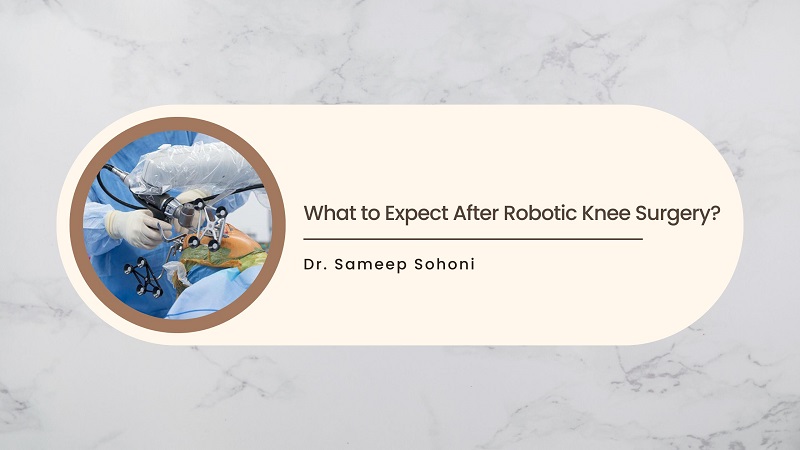What To Expect After Robotic Knee Surgery? Robotic Knee Replacement Recovery Timeline

The rise of technology has changed many fields, & healthcare is no exception. One such advancement is the introduction of robotic knee replacement surgery, which has revolutionized orthopedic therapy.
Dr. Sameep Sohoni, a renowned robotic joint replacement doctor in Thane, pioneered this medical advancement, giving patients a new lease on life. But what to expect after robotic knee surgery? Let’s get into the facts.
What is the Success Rate of Robotic Knee Replacement?
Robotic knee replacement surgery is a minimally invasive procedure that utilizes robotic-arm technology to help surgeons perform precise & accurate knee replacements. This innovative technique offers numerous advantages over conventional knee replacement methods, including less pain, faster recovery, & better surgical outcomes.
The question is “what to expect after robotic knee surgery?” The success rate of robotic knee replacement surgery is high, with patients experiencing improved outcomes & enhanced long-term joint function. The advanced technology in robotic surgery enables more accurate & precise implant implantation, resulting in enhanced alignment & a more comfortable joint feeling.
On the other h&, the surgeon’s skill & the patient’s general health might impact the outcome.
Research Analysis: Robotic Knee Replacement Reviews
In a meta-analysis & systematic review, robotic-assisted total knee arthroplasty (rTKA) was compared to conventional total knee arthroplasty (cTKA). The research included 18 studies with a total of 2234 rTKA & 4300 cTKA patients. Compared to conventional TKA, robotic TKA demonstrated more precise prosthesis implantation with fewer alignment deviations, lower mean blood loss, & potentially marginally improved clinical outcomes. Both procedures proved dependable & risk-free.
Overall, patients who have undertaken robotic knee replacement surgery have provided overwhelmingly positive reviews & testimonials. Compared to conventional knee replacement surgery, numerous patients report shorter recovery times, less pain, & increased joint mobility. The precision of robotic technology contributes to patient satisfaction & successful outcomes.
Problems with Robotic Knee Surgery
Robotic knee surgery is typically safe & successful, but it might have complications & risks like any surgery. Some potential complications of robotic knee surgery include the following:
- Infection: There is always a chance of infection after surgery, even minimally invasive robotic knee replacement.
- Nerve or Blood Vessel Injury: The precision of robotic knee surgery reduces the risk of nerve or blood vessel injury, but it can still occur in certain instances.
- Blood Clots: Deep vein thrombosis, the formation of blood clots in the extremities, can occur after knee surgery, particularly in patients with certain risk factors.
- Implant Loosening: While robotic surgery aims to ensure precision implant placement, implant loosening over time may necessitate additional intervention.
Conclusion
Robotic knee surgery has revolutionized knee replacement procedures & “what to expect after robotic knee surgery” resulting in enhanced patient outcomes & quality of life. For many patients, the benefits of surgery outweigh its risks. Therefore, when you require the best guidance & care for a knee replacement, consult Dr. Sameep Sohoni.
FAQ
What are advantages and disadvantages of robotic knee replacement?
The advantages of robotic knee replacement include precise implant placement, less tissue damage, & speedier recovery. However, it has potential disadvantages, including the requirement for preoperative imaging & the possibility of technical errors or malfunctions.
Is robotic knee replacement surgery time shorter?
Like conventional knee replacement, robotic knee replacement surgery typically takes up to 1-3 hours. However, the precise duration can differ depending on the specifics of each case.
Is robotic knee replacement better than conventional knee replacement?
Robotic knee replacement can improve patients’ outcomes, including enhanced implant alignment & decreased postoperative discomfort. However, the optimal option is patient-specific & should be discussed with Dr. Sameep, a robotic joint replacement doctor in Mumbai specializes in knee replacements.
How much does robotic knee surgery cost?
Robotic knee surgery costs can vary depending on location, surgeon’s expenses, & insurance coverage. Due to the high-tech equipment required, the cost is often more than that of a conventional knee replacement.
What is the robotic knee replacement recovery timeline?
Many patients can return to normal activities within six weeks following a robotic knee replacement, which is shorter than conventional surgery. However, complete recovery can take months.
Dr. Sameep Sohoni – The Best Robotic Joint Replacement Doctor in Thane
Dr. Sameep Sohoni, a prominent a Knee Replacement Surgeon in Thane, is highly experienced in robotic knee replacement surgery, guaranteeing outstanding outcomes & patient satisfaction. He is the leading orthopedic physician, with over 12,000 patients & 12 years of experience.
To guarantee a successful & seamless recovery after robotic knee surgery, consult an experienced & trained orthopedic surgeon Dr. Sameep Sohoni. His expertise includes robotic joint replacement surgery, fracture surgery, bone & joint disorders, sports injuries, & arthritis treatment.
Reference
- https://www.researchgate.net/publication/342164399_Robotic-assisted_total_knee_arthroplasty_is_comparable_to_conventional_total_knee_arthroplasty_a_meta-analysis_and_systematic_review
- https://www.hopkinsmedicine.org/health/treatment-tests-and-therapies/minimally-invasive-total-knee-replacement
- file:///C:/Users/nehaf/AppData/Local/Microsoft/Windows/INetCache/IE/H7DBWGZN/Cuvis_Patient_Education_Booklet_D6[1].pdf
- file:///C:/Users/nehaf/AppData/Local/Microsoft/Windows/INetCache/IE/TDKZI6UO/Cuvis_Joint_Brochure[1].pdf

 Next Post
Next Post
